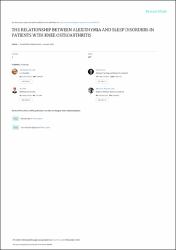The relationship between alexithymia and sleep disorders in patients with knee osteoarthritis

Göster/
Erişim
info:eu-repo/semantics/openAccessTarih
2013Yazar
Özyürek, SelahattinKaya, Erkan
Kaplan, Cengiz
Köse, Özkan
Sivrioğlu, Ali Kemal
Atik, Aziz
Gökçen, Bahadır
Çarlı, Alparslan Bayram
Üst veri
Tüm öğe kaydını gösterÖzet
Background: Among patients with knee osteoarthritis (OA), sleep disorders is highly prevalent and significant due to chronic pain. This pain is more obvious in patients who display the characteristics of alexithymic personality (AP).
Aim: To evaluate sleep disorders and its relationship to alexithymia in patients with knee OA.
Materials and Methods: The study comprised 305 patients aged 60 years and older diagnosed with knee OA. The data scales used in the study comprised 18 questions including the socio-demographic characteristics, general health status, and sleeping habits of the participants, the Toronto Alexithymia Scale (TAS) and the Pittsburgh Sleep Quality Index (PSQI).
Results: A total of 305 patients were included in the study, comprising 122 (40%) males and 183 females (60%). AP was present in 179 (58.7%) of the participants and the PSQI score was over 5 in 175 participants (57.4%). A significant positive correlation was observed between the total sleeping score and the alexithymia score of patients with knee OA (r=0.270 p=0.046).
Conclusions: The application of scales such as the PSQI or TAS in patients with knee OA may be instructive in the management of the disease. Patients with knee OA should be regularly screened for sleep quality and alexiythimic personality as part of routine care.

















